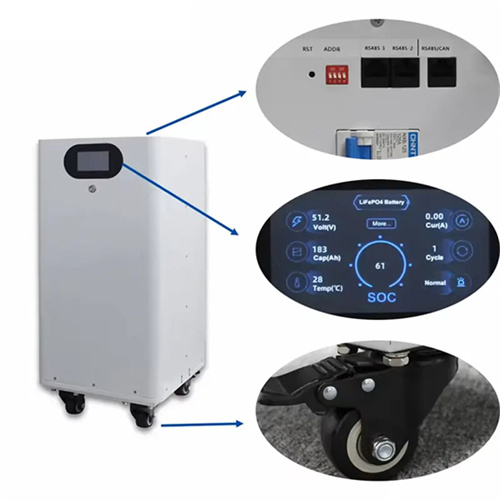Djibouti power wall system

Least Cost Electricity Master Plan, Djibouti
Within the context of electricity, Djibouti''s main (Boulaos) and secondary (Marabout) power plants, running on costly heavy fuel oil (HFO) and diesel respectively, currently offer a total installed generation capacity of 95 megawatt (MW) to the main interconnected system that serves Djibouti-Ville and surrounding areas.

(PDF) Application of 30 MWp Grid-Connected Solar Photovoltaic Power
In order to realize Djibouti Vision 2035, the Republic of Djibouti signed an agreement with an Emirati company (AMEA) to build the first solar photovoltaic power plant in Grand Bara.

Least Cost Electricity Master Plan, Djibouti
Within the context of electricity, Djibouti''s main (Boulaos) and secondary (Marabout) power plants, running on costly heavy fuel oil (HFO) and diesel respectively, currently offer a total installed

Energy in Djibouti
The peak annual demand in 2014 was about 90 MW but is expected that it will grow to about 300 MW by around 2020. Electricity supply services are provided through the vertically integrated utility Electricité de Djibouti (EDD). A small amount of additional energy is generated by a solar plant (300 kW capacity). Djibouti has wind and geothermal generation potential and is actively studying these options.

Project Information Document (PID)
Djibouti, namely, to: achieve economic diversification; enhance the governance and capacity of its public institutions; develop its human capital; and address risks to national unity and security. The objectives are to

Electrical grid of Djibouti and population repartition
The corresponding pattern is known as off-grid electrification: providing electricity where it is consumed using small-scale and suited to the needs stand-alone power systems (Adkins et al.,...

Djibouti redesigns energy systems to increase power generation
Djibouti''s substantial potential for geothermal electricity generation, along with its rising capacity to produce energy from wind and solar power plants, should help the country reach its goals in coming years. In addition to the growing need for generation capacity, the expansion of renewable energy is key for Djibouti to diversify its economy.

Djibouti''s Power Sector Outlook
Djibouti''s Power Sector Outlook. Gross energy demand and peak demand are forecasted to grow, respectively, from 1,312 GWh in 2020 to 2,713 GWh in 2037. Installed capacity in Djibouti is expected to grow from c.253 MW in 2020 to c.1,112 MW in 2037. The amount of electricity which can be imported from Ethiopia is expected to increase to ~181 []

Energy in Djibouti
Djibouti''s Vision 2035 aims to achieve universal electricity access and power the nation with 100% renewable energy. Already, it sources approximately 65% of its electricity from Ethiopia (mainly hydroelectricity; renewable) via an intertie, reducing its reliance on imported fossil fuels.

Djibouti redesigns energy systems to increase power generation
Djibouti''s substantial potential for geothermal electricity generation, along with its rising capacity to produce energy from wind and solar power plants, should help the country reach its goals in

ENERGY PROFILE Djibouti
Onshore wind: Potential wind power density (W/m2) is shown in the seven classes used by NREL, measured at a height of 100m. The bar chart shows the distribution of the country''s land area in each of these classes compared to the global distribution of wind resources. Areas in the third class or above are considered to be a good wind resource.

6 FAQs about [Djibouti power wall system]
How can Djibouti achieve its energy goals?
Djibouti’s substantial potential for geothermal electricity generation, along with its rising capacity to produce energy from wind and solar power plants, should help the country reach its goals in coming years. In addition to the growing need for generation capacity, the expansion of renewable energy is key for Djibouti to diversify its economy.
How does Djibouti produce electricity?
This is mostly supplied by thermal power plants that utilise oil and diesel as fuel. The two primary plants in Djibouti City have a combined generation capacity of roughly 122 MW, with two smaller plants located in Obock and Tadjoura.
What is Djibouti's electricity demand?
Based on 2020 data, Djibouti's national electrification rate reached 42%, (1% in rural areas, 54% in urban areas). Djibouti has vast untapped renewable energy sources, namely geothermal, solar, and wind. The peak annual demand in 2014 was about 90 MW but is expected that it will grow to about 300 MW by around 2020.
Can Djibouti produce geothermal energy from urban waste?
To this end, US-based CR Energy Concepts, in collaboration with the Ministry of Energy and Natural Resources, launched a project in 2019 to produce 35 MWh of baseload electricity from urban waste. Exploration of Djibouti’s geothermal potential began in the 1970s, but progress in subsequent decades was slow.
What is Djibouti's Vision 2035?
Djibouti's Vision 2035 aims to achieve universal electricity access and power the nation with 100% renewable energy. Already, it sources approximately 65% of its electricity from Ethiopia (mainly hydroelectricity; renewable) via an intertie, reducing its reliance on imported fossil fuels.
Will Djibouti become the first African country to meet 100% electricity demand?
The authorities have announced plans to transform Djibouti into the first African country to fulfil 100% of its electricity demand from clean energy sources by the close of the plan in 2035. The Ministry of Energy and Natural Resources formulates policies for the sector and regulates the electricity market.
Related Contents
- Djibouti power x company
- Nuclear power plant battery Djibouti
- Saint Helena solar power wall
- Power wall battery price in Mexico
- Power wall 3 South Africa
- India power wall solar
- Home power wall Ecuador
- Sierra Leone power wall system
- St Vincent and Grenadines power wall 3
- Home power wall British Virgin Islands
- Curtain wall glass combined with solar power generation
- Cost of battery storage system Djibouti